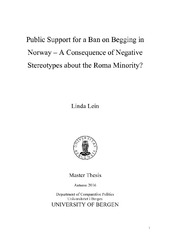| dc.description.abstract | This thesis examines whether public support for a ban on begging in Norway is influenced by negative stereotypes about the Roma minority. In 2005, the ban on begging was abolished in Norway by a unanimous vote in Parliament. Nine years later, however; a new discussion flourished about whether or not the ban on begging should be re-introduced. The change in public debate followed a change in the composition of the population of beggars in Norwegian streetscapes. After the eastward expansion of the European Union, Norway as a member of the European Economic Area experienced a similar increase in poor members of the Roma minority begging on the street, as did most EU-member states. To address the research question, I collected original survey data through the Norwegian Citizen Panel in 2015 (wave 5) as part of a project funded by the EEA and Norway grants entitled "Less Hate More Speech." In the Norwegian Citizen Panel I fielded both standard close-ended survey-questions about negative stereotypes and new open-ended questions, which allowed participants to formulate their thoughts about beggars and the Roma minority in their own words. In analyzing the data, I in part rely on traditional regression analysis, and in part on randomized experiment. The results of this thesis show that public support for a ban on begging in Norway is strongly affected by negative stereotypes toward the Roma minority. These findings are significant on a 99 percent level, and are found to be significant in three different models that implement two different stereotype measurements - one traditional measurement (based on close-ended survey questions) as well as an original measurement (based on open- ended survey questions). This thesis has shown for the first time that widespread support for a ban on begging in contemporary Norway is strongly influenced by negative stereotypes about the Roma minority. This adds to our knowledge both about the consequences of European enlargement for Norway, and additionally to our knowledge about why a ban on begging has been such a controversial and difficult political issue over the past years in Norway. | en_US |
